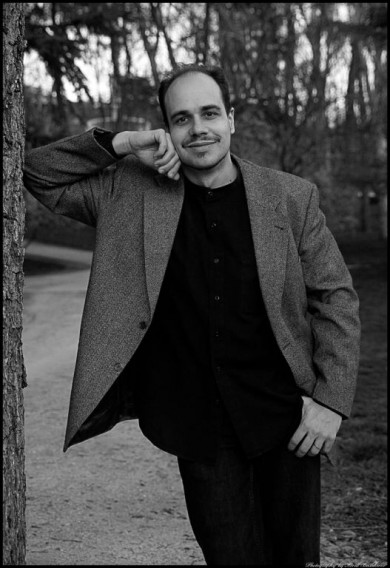Martinez-Mehner opens Miami Piano Festival series with subtle artistry

Claudio Martinez-Mehner opened the Master Series of the Miami International Piano Festival Sunday at the Broward Center.
At first glance, the composers selected for a concert Sunday at the Broward Center’s Amaturo Theater by the pianist Claudio Martinez-Mehner appear to represent the ultimate in traditional programming.
Bach, Beethoven and Brahms were on the bill, the canonical “Three B’s” formulated by the 19th-century conductor and pianist Hans von Bülow (who was updating a previous Three B list to make room for his friend Brahms by ejecting Hector Berlioz).
But the pieces selected to open the Master Series of the Miami Piano Festival were, for the most part, among these composers’ less frequently performed works. From Brahms came his Seven Fantasies, composed five years before his death. From Beethoven, came the Piano Sonata Op. 101, often taken as the first of his late-period works. And from Bach, in addition to selections from the famous Well-Tempered Clavier, was the rarely performed, unfinished Suite in F Minor.
Before the concert, Giselle Brodsky, artistic director and co-founder of the festival, spoke of the festival’s attempt to uphold artistic values in the face of the “flash and brute virtuosity” celebrated in competitions and the larger concert world.
Few pianists embody the rejection of that contemporary concert world more than Martinez-Mehner, a pianist who never showed much interest in the life of a touring virtuoso , and who displays little flash in programming or performance, despite a rock-solid technique.
He opened with four preludes and fugues from Bach’s Well-Tempered Clavier, Book II. Many pianists play Bach in a pointed, percussive manner, as if to imitate the clipped tones of a harpsichord. Not Martinez-Mehner. He played a pianist’s Bach, making extensive use of the pedals and taking full advantage of the range of colors and textures offered by the modern instrument.
In the F-sharp Major Prelude, for example, his fluent touch at the keyboard created a dreamy, soft-edged mood not usually associated with Bach, with long-lined phrases that effectively expressed the work’s lyricism. The fugues came off in a more marked manner, with Martinez-Mehner constantly imposing order and bringing out the leading voices in these complex works. He brought a quiet intensity to the F-sharp Minor, the subtle power of his playing seeming to let Bach’s music to build in force on its own.
The Bach Suite in F Minor consists of three movements. Of these, the most striking playing came in the Sarabande, where Martinez-Mehner wrested maximum power from the piano in Bach’s otherworldly procession of harmonies without any increase in volume, allowing the composer’s music to speak for itself.
The Beethoven sonata was written the year before the composer began work on his Ninth Symphony. The opening movement unfolded with Martinez-Mehner appearing to emphasize the questioning nature of the phrases, giving these seemingly untroubled melodies a sense of restlessness. The slow movement was a quiet yet sonorous procession of chords, as Martinez Mehner’s sure touch at the keyboard made the sounds emerge with as little percussiveness as possible.
Like the famous “Hammerklavier” Sonata that Beethoven would compose next, this sonata is weighted toward the last movement. Having displayed his ability to play with subtle intensity, Martinez-Mehner gave a big, sweeping performance of this complex, contrapuntal movement, with his firm technique serving him well to keep the fast-moving notes distinct. Although at a couple of points the complex music became something of a blur, this was a rollicking, high-spirited performance.
Brahms’ late-career Fantasies appear infrequently on South Florida concert programs. This master of big forms such as symphonies and concertos composed a set of brief mood pieces of the sort favored by Schumann and Chopin, with passionate outbursts and ruminative introspection following close upon each other.
Martinez-Mehner emphasized the wide gulf between the emotions in these works. There was nothing subtle about his playing of the opening Capriccio, which he attacked in an almost furious manner, giving the rapid cascades of notes a much more aggressive treatment than many pianists. This had the effect of emphasizing the contrast with the following Intermezzo, played in a quiet but urgent manner. The Allegro passionato came off as a raw-edged outburst, and he followed with a song-like, almost Chopinesque performance of the Adagio.
The Miami Piano Festival’s Master Series continues 8 p.m. Monday at the Broward Center with the pianist Nick Van Bloss playing Beethoven’s Diabelli Variations and Bach’s Partita No. 2. miamipianofest.com
Posted in Performances
One Response to “Martinez-Mehner opens Miami Piano Festival series with subtle artistry”
Leave a Comment
Mon Feb 29, 2016
at 9:54 am
1 Comment







Posted Mar 01, 2016 at 1:33 pm by Norman Courey
Excellent and accurate description of the performance. I was there to witness it.